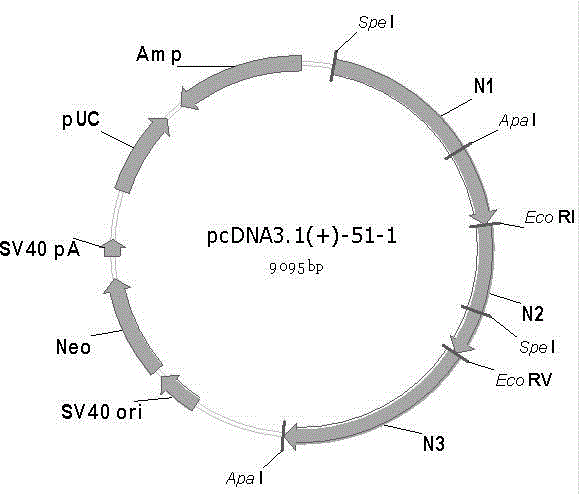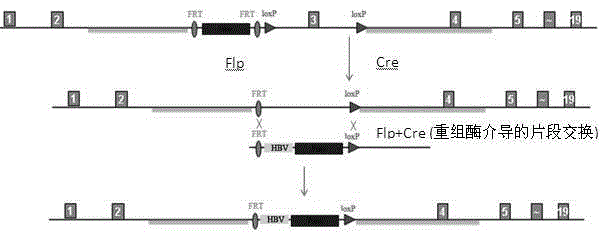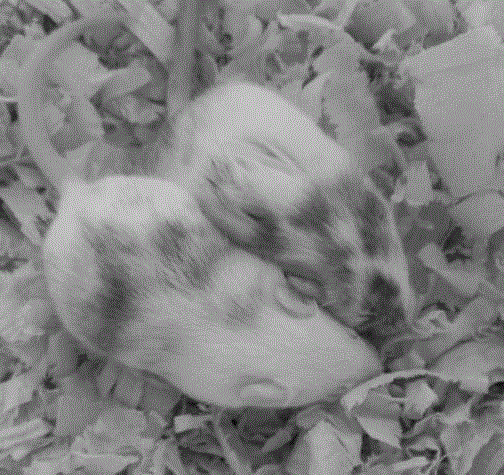Constructing method of 1.3 copy C gene type HBV transgenic mice
A technology of transgenic mice and construction methods, applied in the field of animal model construction, can solve the problems of less research on C-type transgenic mice, and achieve the effects of improving transgenic efficiency, abundant research methods and high efficiency
- Summary
- Abstract
- Description
- Claims
- Application Information
AI Technical Summary
Problems solved by technology
Method used
Image
Examples
experiment example 1
[0061] Experimental Example 1 Construction of 1.3 copy C genotype HBV transgenic mice
[0062] 1. Establishment of embryonic stem cell (ES cell) line
[0063] (1) Take C57BL / 6J female pregnant mice 3.5 days of pregnancy, and kill them by breaking their necks.
[0064] (2) Use 75% alcohol to disinfect the pregnant mice killed by S11, and spray the whole body as much as possible.
[0065] (3) Open the abdominal cavity of the pregnant mouse, repair and remove the fat and mesangium, cut the bilateral uterus from the root of the fallopian tube and the bifurcation of the lower end of the uterus, and cut the bicornuate uterus at the vagina.
[0066] (4) The syringe sucks M2 (purchased from American Sigma company) as the embryo preparation solution. Before using the syringe needle, cut off the tip of the needle and sterilize it; insert the syringe from one end of the uterus into the uterine cavity 2~3mm, clamp it, Blow in the embryo flushing fluid, then insert the syringe from the other end o...
experiment example 2 Embodiment 1
[0093] Experimental Example 2 Example 1 Preparation of 1.3 copies of Type C HBV transgenic mice
[0094] 1. Statistics of mouse mosaic rate
[0095] (1) Judging the chimeric rate of mice based on the color of the mouse's coat: Since the ES cells are derived from black-haired C57BL / 6J mice, and the blastocysts are derived from white-haired KM mice, the judgement is based on the percentage of black hair in the born mice Mice chimerism rate.
[0096] (2) Combine the obtained chimeric mice (F0 generation) and normal KM mice in a cage. If the obtained F1 generation mouse is a chimeric mouse, it is proved that the F0 generation chimeric mouse has reproductive chimerism and can be inherited to the next generation.
[0097] 2. ELISA detects hepatitis B surface antigen (HBsAg) and hepatitis B e antigen (HBeAg) in serum and urine of transgenic mice. The detection methods are as follows:
[0098] (1) Detection of hepatitis B surface antigen (HBsAg) (ELISA method)
[0099] Use the hepatitis B vir...
experiment example 3 Embodiment 1
[0122] Experimental Example 3 Example 1 Preparation of 1.3 copies of Type C HBV transgenic mice Passage identification
[0123] 1. Combine the chimeric mice (F0 generation) prepared in the example and normal KM mice to obtain 32 F1 generation mice.
[0124] 2. The statistics of mouse mosaic rate and the method of ELISA to detect hepatitis B surface antigen (HBsAg) and hepatitis B e antigen (HBeAg) in the serum and urine of transgenic mice are the same as in Example 2.
[0125] 3. Identification results
[0126] (1) Five of the 32 F1 generation mice are positive chimeric mice, and the positive rate of chimeric mice is 15.6%, indicating that the method of the present invention constructs chimeric mice that can be passed down.
[0127] (2) The 5 F1 chimeric mice were numbered B1~B5.
[0128] The results of ELISA detection of hepatitis B surface antigen (HBsAg) and hepatitis B e antigen (HBeAg) showed that HBsAg and HBeAg in serum and urine of B1~B5 mice were positive. The measured OD valu...
PUM
 Login to View More
Login to View More Abstract
Description
Claims
Application Information
 Login to View More
Login to View More - R&D
- Intellectual Property
- Life Sciences
- Materials
- Tech Scout
- Unparalleled Data Quality
- Higher Quality Content
- 60% Fewer Hallucinations
Browse by: Latest US Patents, China's latest patents, Technical Efficacy Thesaurus, Application Domain, Technology Topic, Popular Technical Reports.
© 2025 PatSnap. All rights reserved.Legal|Privacy policy|Modern Slavery Act Transparency Statement|Sitemap|About US| Contact US: help@patsnap.com



